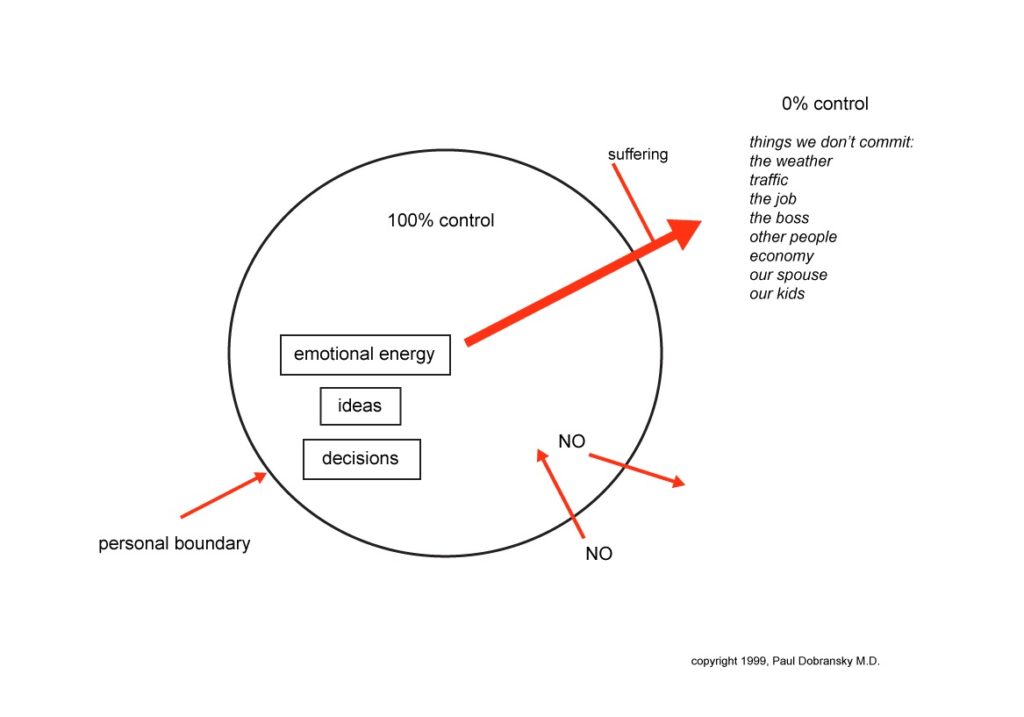The outer "wall" of the psyche, which acts as a shield against emotional harm, and to the best it can, to psychological trauma, the boundary is a filter that blocks stress out but allows opportunity to get in, a gate that facilitates or blocks communication, interaction and other behavior, and a container of one's psychological resources.
It contains three main, anatomical parts: holes, walls and doors.
Walking Though the Anatomy of the Personal Boundary, Step By Step
Boundary Holes ➳
Boundary holes allow anything in or out, including good things and bad things. It is like saying, "yes" to everything that happens socially. As a result, one has an "external locus of control," in which the uncontrollable in the social environment, controls us. We "suffer" through holes in the personal boundary, bring energy, time, money and other resources trying to control what cannot be controlled. Holes are fixed through getting accustomed to the word, "NO." Saying it and hearing it.
Boundary Walls ➳
Boundary walls block all things, both good and bad from getting in or out. Often the result of psychological trauma, walls leave one relatively protected against stress, but also lonely and lacking social interaction. This is a bit like a perpetual and universal, "NO," to the opportunities that come our way, along with the negatives and stress.
Boundary Doors ➳
Boundary doors are the most mature anatomy to have. They operate with one's decisional capacity to use wisdom, a combination of conscience, or ethics, and intuition, or a read on the level of opportunity in the environment. This is like learning to say, "NO," to things that are not good for us, and, "YES," to things that are good for us.
When we have holes in our personal boundary, we suffer.
Suffering ➳
Suffering has been used in a general way by people to denote an experience of negative emotion. However, in Romantic Dynamics, it is specific to an immature flaw of one’s personal boundary, called a “boundary hole.” These “holes” are the “buttons” that people are said to push in us. It is through these holes that stress can easily get in us.
Stress ➳
Where self-esteem is composed of positive emotional energy, or happiness, and is composed of the two types of self-esteem, called, “well-being” and “confidence,” stress is the negative version of this. Stress, then, is also composed of emotional or chemical energy, and yet is a negative form of it. If our boundary holes allow stress in, it depletes some of our self-esteem.
Self-esteem ➳
A form of positive emotional energy conceived of by Romantic Dynamics, as existing in the Mammalian Brain, where the emotions reside in the mind. It has several synonyms in the form of “happiness,” “friendship,” and is the antithesis and antidote to stress, resisting and dispelling stress in equal degrees. When we have weak boundaries with holes in them, stress-intolerance, and low self-esteem, we tend to get into codependent relationships.
Codependence ➳
Codependence is a state of connection between two people which, like the states of intimacy, independence, and interdependence, pertain to the function of personal boundaries between the two people. In the case of codependence, there must be a preponderance between the two people, of having more boundary holes in their personal boundary than walls or doors.
Independence ➳
Independence is a state of connection between two people which, like an opposite to the state of intimacy, allows someone to reorient themselves to their personal identity, beliefs, limits and preferences. In occasional use, it lends balance to a mature, romantic relationship.
Interdependence ➳
Interdependence is a state of connection between two people which is dynamic and adaptable to the changing conditions of both partners, and also the environment around them. It adjusts between occasional states of intimacy, and at other times, a state of independence from each other.
Pathological Narcissism ➳
In the Romantic Dynamics model, “pathological narcissism” is an important feature of our psychology which can shoot down nearly any aspect of romance, and ruin the progress in any of the three phases of courtship. When one has boundary holes dominate, they are very narcissistic. When they have mainly boundary walls, they are possibly traumatized, and still somewhat narcissistic, not interactive with others. But when they have boundary doors dominate their boundary anatomy, they are the most mature of character virtue, and the only fit state to be in for the purposes of having a lasting romantic partnership and intellectual attraction.
Personal Boundary topics then have the most to do with intellectual attraction and committed partnership, with much more info on the topic, HERE.


